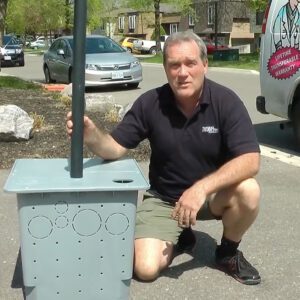Most homes with basements will leak eventually, and this isn’t necessarily caused by poor construction or damage–most of the time it is caused by time and the forces of nature such as shifting concrete, settling dirt, and water seepage through windows.
Hydrostatic or lateral pressure
Rising water tables in your area caused by excessive rain or snow can cause the soil to become supersaturated and result in hydrostatic pressure which can lead to a leaky basement. When storm water can’t be absorbed, water pressure rises and the water has to go somewhere–unfortunately that somewhere can be in your basement! Homes with a less-porous soil such as clay are not able to allow the water to drain as effectively as soils with loam or sand in them, so clay-based soils can cause a lateral pressure as they expand from the amount of water washing through them.
Hydrostatic or lateral pressure can also cause leaks in the basement floor, typically a thin 2-4 inch concrete pad that has no structural role in the house’s foundation. Pressure from below the foundation can cause cracks in this pad, leading to water leakage. Call the Crack Doctor to investigate whether your leaky basement is caused by hydrostatic pressure, and they’ll come up with a tailored solution that keeps your basement dry and safe.
Water seepage
Water can seep into your basement in a variety of ways: around windows, over the top of foundation walls, through mortar joints and even through cracks in porous concrete walls. Flexible clay or foam can be injected generally from inside the basement into visible cracks to keep them from expanding. The foam or clay is flexible to allow it to move with future cracks and settling to keep the basement dry. Minor flaws in the mixing process of the concrete can cause concrete that’s porous enough to admit water seepage. One permanent way to solve seepage is to install an exterior waterproofing membrane, where a wall is excavated around the outside and cleaned before a technician uses a trowel to apply a modified polyurethane to the walls forming a waterproof barrier. Additional measures could include adding a heavy-duty board to drain water down the wall or addition of an insulating material.
Window wells can also be a major source of additional water in your basement. If window wells are present, checking them often to ensure they are free of clogs or cracks and are well-routed to keep the water away from your basement will help you keep your basement dry and your valuables safe from mold and mildew caused by excessive moisture.
No matter the cause of your leaky basement, The Crack Doctor can solve the issue to keep your basement safe and dry.


